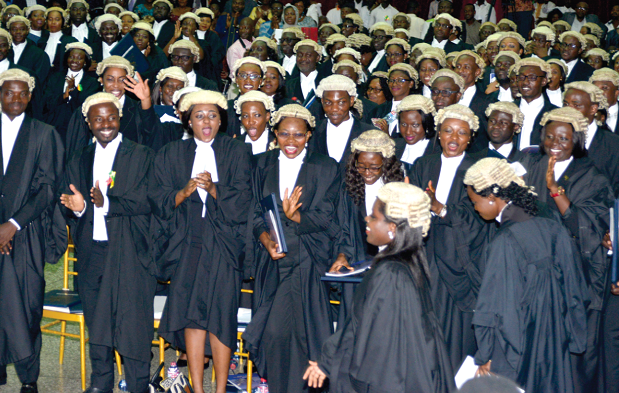
Entrance examination to Ghana School of Law unconstitutional - Supreme Court
The Supreme Court has, in a unanimous decision, declared as unconstitutional a requirement by the General Legal Council (GLC) that persons seeking to enter the Ghana School of Law (GSL) need to pass an entrance examination, as well as an interview.
Advertisement
The court held that the additional requirement, which started in 2012, violated articles 11(7), 23, 296 (a) (b) and 18 (2) of the 1992 Constitution, as well as Legislative Instrument (LI) 1296 which spells out the criteria or qualification for admission to the school.
Per Regulation Two of the LI, qualifications for entry to the school are: being of good behaviour, having a degree conferred by the University of Ghana and any other university approved by the council and passing examinations in seven subjects approved by the council.
The court’s decision followed a suit in which the plaintiff, Professor Kwaku Asare, a United States-based Ghanaian law lecturer, went to court in October 2015, challenging the legality of the criteria for admission used by the GSL.
No retrospective effect.
The seven-member panel, presided over by Mr Justice Jones M. Dotse, also declared that its decision did not take retrospective effect but should be implemented when admission for the 2018 academic year begins.
The court maintained that it would not want to interfere in the work of the school this academic year, given the effect it would have on the admission process.
The court, in a decision read by Mr Justice Sule Gbadegbe, recommended that the GLC should allocate quotas to the University of Ghana and other institutions of study approved by the council to ensure that the huge number of students was admitted to the school according to the facilities at its disposal.
It also ordered the GLC to take steps within the next six months to review the process of admission to the GSL.
More out, less in
Currently, the Law faculties in the various universities graduate more than 1,000 students with the Legum Baccalaureus (LLB) degree annually, but the GSL has facilities to accommodate only 250 of them to pursue the professional law course.
It was the case of the plaintiff that the facilities be expanded to allow qualified LLB holders to continue their professional course at the school, but the court held that the plaintiff failed to provide evidence that suggested that the school had the facilities and the lecturers to cope with the numbers.
It was the argument of the GLC that the plaintiff did not have locus to institute legal action against it at the Supreme Court, but the court maintained that the issue was one of public interest, hence it needed not affect the plaintiff directly to invoke the powers of the Supreme Court.
Mr Justice Gbadegbe stated that the court’s enforcement jurisdiction could be invoked and not only interpretation.
The court, however, dismissed reliefs, including that the GLC should, within 60 days, find alternative places and modes of instruction that would afford all persons meeting the requirement of Regulation 2 of LI 1296 an opportunity to pursue the professional component of legal education, the completion of which entitles them to take the qualifying certificate examinations as determined by the GLC.
Mr Justice Dotse commended the plaintiff for bringing the case to court, saying it contributed to enriching the country’s jurisprudence.
The panel
Other members of the panel were Mr Justice Kwasi Anin Yeboah (who had travelled), Mr Justice Paul Baffoe-Bonnie, Ms Justice Vida Akoto-Bamfo, Mr Justice Anthony Alfred Benin and Mr Justice Gabriel Scott Pwamang.
Declarations
The plaintiff was seeking a declaration that pursuant to Regulation 2 of LI 1296, a person is qualified for admission to pursue the Professional Law Course at the GSL or other alternative places of instruction specified by the GLC if: (a) he is of good behaviour; (b) he has a degree conferred by the University of Ghana or any other university or institution approved by the council, and (c) he has passed the final examination in the list of seven subjects specified at Regulation 2(c).
In consequence, any administrative fiat that seeks to vary these requirements is contrary to constitutional right and power, unlawful, void and of no consequence.
He also sought a declaration that the GLC’s decision to allow only 251 of the 875 students who qualify under Regulation 2 of LI 1296 to pursue the professional component of legal education is arbitrary, capricious, biased, did not follow due process, is not in accordance with law, is in excess of statutory authority and is contrary to constitutional right and power.
Additionally, the plaintiff also sought a declaration that the entrance examination to the GSL and the subject matter of that examination, not backed by any legislative instrument, are not cognisable at law and cannot be used as a basis to deny students the opportunity to pursue their professional education.
Prof. Asare also sought a declaration that the council’s decision to use interviewing, a highly subjective and unreliable mode of examining students, is arbitrary, capricious, biased, did not follow due process, is not in accordance with law, is in excess of statutory authority and contrary to constitutional right and power.
Further, he also sought the court’s order to declare that the admission practices of the GSL are arbitrary, capricious, biased, do not follow due process, violate articles 296 and 23 of the Constitution and an affront to LI 1296.



